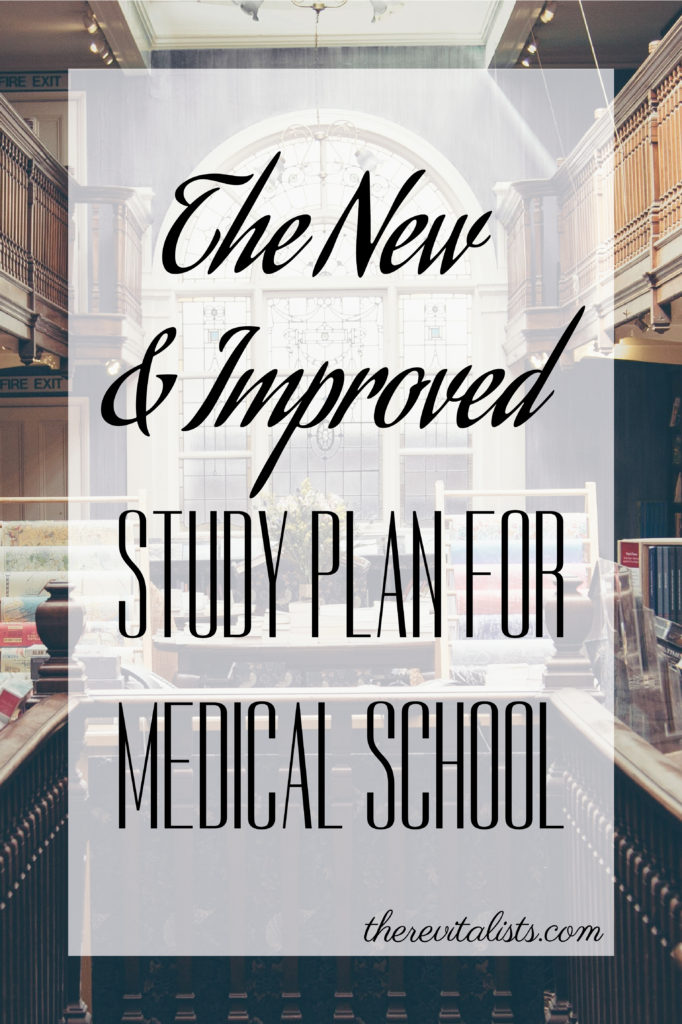This post contains affiliate links. For more information, see my full disclosure policy.
With the new school year in full swing, I wanted to take some time to do an update on what I use in my study plan for medical school. One of the biggest hurdles to get over when starting medical school is figuring out how you learn. With that, figuring out which study practices work best for YOU. The following information is what works best for me and by no means is this the “right way” to study in medical school. In order to be successful you must figure this out for yourself. However, I hope my study plan inspires you to try something new. Especially if your current study plan isn’t quite working out for you!
Developing My Study Plan
With the shift to an organ systems-based curriculum, the first year often starts off with a course on biological principles. This can include topics such as molecular biology, genetics, epidemiology, pharmacology, and immunology. These subjects form the foundation for clinically oriented learning during the following organ systems blocks. At the same time, these foundational courses will seem very familiar. Many concepts learned during undergrad will show up again, with some new information, and at a much faster pace. This is an excellent time to experiment with a different study plan or to try new resources. But, as I learned, when it comes to organ systems, you might need to rethink your study plan again.
The content in the foundations course at my school felt much like a review of known concepts to me. Therefore, I was able to get by with many of the same learning techniques as I did during undergrad. It worked well for that block, but when I started organ systems, I soon realized that it wasn’t working anymore. I was spending a lot of time studying ineffectively and I felt very stressed. It also so happened that the beginning of the organ systems block coincided with buying our house, so the added stress of a renovation made the situation unsustainable.
I decided to make a change in the way I used the resources I did, as well as adding or removing resources as needed. The biggest shift I made was watching my lectures after I had gone through outside resources, rather than the other way around [as I did previously]. The shift seems subtle, but the results were exceptional. I was making more passes through the material, in less time, with less stress over the impending exam.
Textbooks
I begin each unit with reading the associated chapter(s) in either Physiology by Linda S. Costanzo or Robbins Basic Pathology. This will usually take me 2 to 3 days depending on the length of the chapter(s) and my motivation to stay focused.
Videos
After reading, I start watching and taking notes on the relevant units in Boards & Beyond. This can take up to 6 days, but this is where I learn the bulk of the material. I take my time to make sure I understand the concepts here. I use these notes through all future passes, making note of repeated concepts and adding in additional material as needed.
With my notes in hand [on OneNote], I go on to watch the related Kaplan videos and either Physeo or Pathoma, depending on which unit I’m in. This will take me only a day or 2 since I’ve already hammered down most of the material. Depending on my schedule, I may also watch SketchyMedical or I’ll leave these videos until I’m studying for our shelf exam at the end of the block.
Lectures
My next step is actually watching the lectures presented by school faculty for the unit. I follow along with my previous notes in OneNote and the lecture slides in Notability, making sure to make note of emphasized or repeated points. Since I’ve learned and understood the bulk of the material with my previous passes, I can get through lectures rather quickly while still retaining the information. I’ll finish up my lectures in 2 to 3 days.
Review
The last step of my study plan for unit exams involved reading over the notes I’ve made in OneNote. This review step helps me sort out details in my head. Since I’ve discovered I’m a visual learner, I figured out I need to see the words written out in order to hammer down details.
During the week of the shelf exam, we usually have our second unit exam on the Monday and then our shelf exam takes place on the Friday. I always take the Monday after the exam off. No studying at all. [You NEED breaks.] I use the next few days to finish up Sketchy videos [if needed], do UWorld questions, and then review my notes.
And there you have it!
It’s taken a lot of trial and error to figure out what works for me, but it all comes in due time. I’ll continue to tweak my study plan as I need in order to keep studying efficiently. Medical school is just as much about learning about yourself as it is learning about medicine.
Happy studying!





